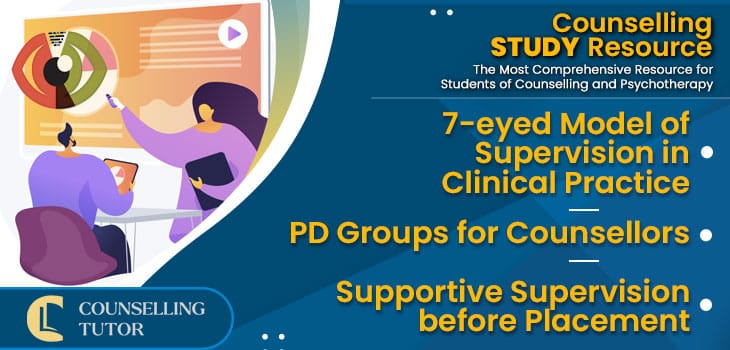See Counselling Skills Used in Real Sessions by Qualified Therapist
Real Sessions – Real Presentations – Real Skills
Gain the competence and confidence to use counselling techniques effectively!

In Episode 327 of the Counselling Tutor Podcast, your hosts Rory Lees-Oakes and Ken Kelly take us through this week’s three topics:
7-eyed Model of Supervision in Clinical Practice
In this section, Rory and Ken dive deep into the relevance and application of the 7-eyed model of supervision in clinical practice. This model encourages a more holistic approach to supervision by looking at client dynamics, counsellor reflections, and the relationships between all involved parties.
Key points from this discussion include:

Real Sessions – Real Presentations – Real Skills
Gain the competence and confidence to use counselling techniques effectively!
In this week’s Practice Matters, Rory speaks with Dr. Sonja Falck about the vital role of facilitating Personal Development (PD) groups for counsellors.
The key points of this conversation include:
– Language Builds Relationships: The way we use language with clients builds the therapeutic relationship. From the first email exchange, it is essential to use language that creates a safe, respectful environment.
– Acknowledging Mistakes: If you make a mistake, acknowledge it openly. This helps to create a collaborative dynamic in therapy.
– Creating Metaphors: Developing metaphors tailored to the client’s experience can externalise the problem, making it easier for the client to view and work through challenges.
– The Value of PD Groups: PD groups provide a space for counsellors to work on their own development. Facilitators need specific training to ensure these groups are effective and safe for participants.

On-demand access to a rich lecture library covering theory, skills, and professional development for counselling students—Mapped to the UK awarding body criteria
“The Student Library has been BRILLIANT, I can’t recommend it enough!
It has been a lifeline in helping me prepare for practice and my first clients. If you’re considering it, go-for-it, it’s absolutely worth it!”
Kelly – Graduated and now in practice.
In ‘Student Services’, Rory and Ken discuss accessing supervision before placement and why it’s so important to establish a supportive supervision relationship early on.
Key points discussed include:
– Getting Supervision Before Placement: It’s critical to find a supervisor before you begin working with clients in placement. This ensures that you are prepared and supported in your practice.
– What to Look for in a Supervisor: Consider the supervisor’s experience, approach, and how they resonate with you personally. The relationship with your supervisor can significantly impact your development as a counsellor.
– Preparing for Your First Client: Supervision before placement helps counsellors feel more confident and prepared. It provides guidance on ethical issues, documentation, and how to manage client dynamics.
– The Benefits of Supervision: Supervisors are there to help counsellors develop ethically, professionally, and personally. They provide support and insight, helping counsellors navigate challenges they may face in their practice.
7-eyed Model of Supervision in Clinical Practice

Get on-demand Certified CPD that is implementable in your practice
